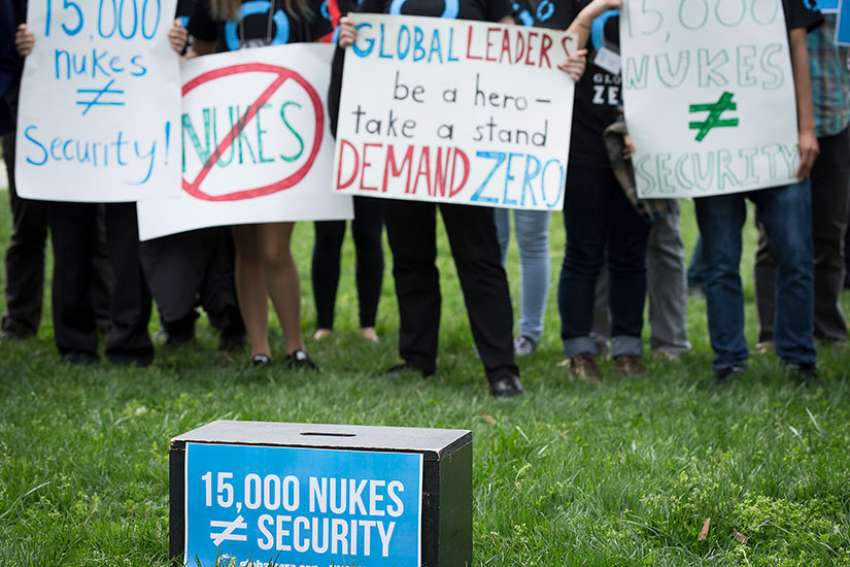The retired Progressive Conservative senator charges that Canada has given into American demands which uphold U.S. interests in maintaining a nuclear weapons program. This abandonment of principle is “irresponsible,” said Roche, who has advised the Holy See on nuclear disarmament issues since 1989.
“I’m calling on the Canadian government to get some backbone,” he said.
Roche’s comments come as diplomatic tensions are rising among nations, from the United States launching missiles into Syria after a chemical attack, to Russia warning U.S. against crossing “red lines” in Syria, to North Korea expanding its nuclear weapons program and the U.S. planning to spend $1 trillion modernizing its arsenal over 30 years.
Late last month, Pope Francis sent a message to representatives of the 132 nations who met at the United Nations to discuss ways to declare nuclear weapons illegal under international law.
“How sustainable is a stability based on fear when it actually increases fear and undermines relationships of trust?” Pope Francis asked.
“The total elimination of nuclear weapons becomes both a challenge and a moral and humanitarian imperative.”
Canada wasn’t at the UN when the Pope’s letter was read. It is one of 35 countries supporting a U.S.-led boycott of disarmament negotiations.
Roche has some advice for Canadian politicians: “Go to the NATO allies and say, ‘This is an intolerable position for NATO to take.’ The hypocrisy is staggering.”
The Canadian government claims it fully supports “a world free of nuclear weapons,” but that the effort to ban them in international law is counterproductive.
“Negotiation of a nuclear weapons ban without the participation of states that possess nuclear weapons is certain to be ineffective and will not eliminate nuclear weapons,” a Global Affairs Canada spokesperson told The Catholic Register in an email. “If anything, it may make disarmament more difficult.”
Previous bans of indiscriminate weapons, such as chemical weapons, were negotiated among countries who possessed stockpiles, said the Global Affairs spokesperson.
Canadian disarmament negotiators are concentrating their efforts on cutting off the production and trade in fissile materials needed to build nuclear bombs.
A legal ban on nuclear weapons is more than a hollow, symbolic gesture, said Project Ploughshares executive director Cesar Jaramillo.
“There’s a chemical weapons convention. There’s a biological weapons convention. There’s an arms trade treaty. There is no unequivocal prohibition on nuclear weapons, which are by far the most destructive of them all,” he said.
The Canadian ecumenical think tank on peace and disarmament issues was in New York for the first round of talks on the UN nuclear weapons ban. The talks will resume June 15-July 7. Jaramillo sees Canada playing both sides of the disarmament game.
“The Canadian government presents itself as an international responsible actor, a non-nuclear weapons state,” he said. “At the same time, Canada is an active member of NATO, the North Atlantic Treaty Organization, which is an open nuclear weapons alliance with an overt policy of nuclear deterrence…. By virtue of its membership in the NATO nuclear planning group (Canada) is perpetuating the existence of nuclear weapons and this logic that they are a legitimate means to ensure national security.”
Pope Francis calls the logic behind nuclear deterrence illogical and immoral.
“An ethics and a law based on the threat of mutual destruction — and possibly the destruction of all mankind — are contradictory to the very spirit of the United Nations,” he said
Like every Pope since Pope John XXIII, Pope Francis wants the money now spent on ever more advanced and destructive weapons systems invested in lifting nations out of poverty.
American Congregation of Notre Dame Sr. Stacy Hanrahan calls the trillion-dollar American nuclear arms update, “a massive amount of money on weapons we can’t use.”
Hanrahan is part of Unanima International, a coalition of 21 Catholic religious orders with official standing at the UN. The sisters have been campaigning for 10 years for an international humanitarian law that would declare nuke possession illegal.
“That there hasn’t been a nuclear catastrophe since Hiroshima is sheer, dumb luck,” said Jaramillo. “But it defies credibility that that luck will last indefinitely.”
Roche believes Canada’s acquiescence to U.S. demands on UN nuclear negotiations result from Ottawa’s fears that the Trump administration might punish Canada in trade negotiations.
“We have to stand up and say, ‘These are not our values,’ ” he said.


